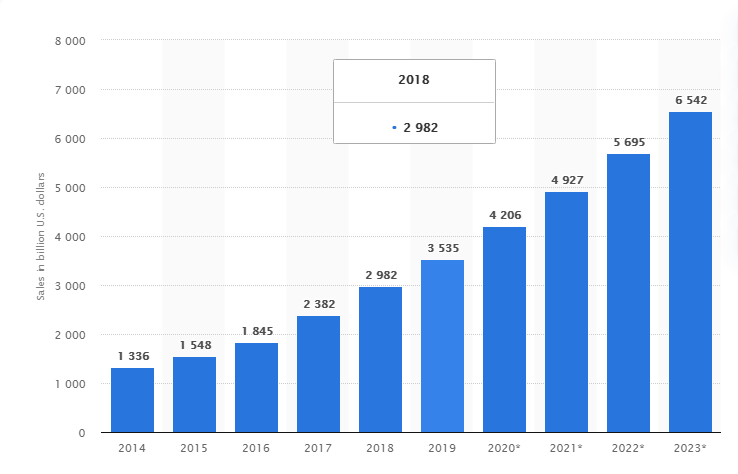The current covid-19 pandemic has transformed the ecommerce sector more than ever in history. While traditional retail has experienced a noticeable decrease in sales, the ecommerce world seems to boom with the speed of light. As long as the world shifted to adopt the new normal things, one thing that is thriving incredibly is online retail sales. The reason behind the rising popularity of ecommerce landscape is the rapidly innovating ecommerce technology trends.
According to the 2019 statistics report, the global ecommerce market sales reached $3.5 trillion, and it can reach up to $4.9 trillion by the end of 2020. So, where is ecommerce world right now and what is the future of online shopping?
Take a glance at the thriving ecommerce sales from 2014 to 2023.
Ecommerce Retail Sales Worldwide From 2014- 2023

The data from the above graph shows that online retail sales are rising continuously with no signs of coming slow. Hence, to survive your online store in today’s cut-throat competitive business world, it’s vital to keep up with the latest ecommerce technology trends.
Five Most Innovative Ecommerce Technology Trends
Let’s take a review of the five groundbreaking ecommerce technology trends that are shaping the future online shopping.
1. Mobile Shopping will dominate
Smartphones have put the whole universe at your fingertips. With 3 billion smartphone users worldwide, the trend of buying anything from anywhere is also increasing. According to the Statistics report 2019, mobile shopping will be accountable for around 73% of online retail sales by the end of 2021. Having that said, ecommerce store owners should shift towards making a robust responsive website, as early as possible. Providing your customers with a mobile-friendly experience will help the consumers to easily shop form every mobile device. Thus, mobile shopping is one of those highly flourishing ecommerce tech trends that will shape the future of online shopping.
2. Actionable Content and Is Driving Sales
Convincing the customers in the crowded ecommerce market is not an easy feat. Besides encouraging them with the latest ecommerce technology trends, you must provide a meaningful, and relevant content on your ecommerce website. Doing so will help you to attract more potential buyers and boost your conversion rates by guiding and helping them to make informed decisions. You can post content in several forms including storytelling, blogs, social media posts and emails etc. Not only this, but you can also encourage your customers using ads, promotions and offering them the free discount codes on buying a variety of products.
3. Machine Learning for More Personalized Experience
Today’s busy shoppers want more personalized shopping experience. They prefer to shop from the brands that suggest the relevant products and offers based on their search history. Today’s data analysts utilize artificial intelligence and machine learning to gather data about customers rather than doing it manually. The intelligent algorithms of machine learning and artificial intelligence, help the data analysts to create customers profiles and then deliver personalized content and recommendations. This personalization is estimated to boost ecommerce sales by up to 15%. So, creating a user-focused experience with machine learning is a top priority for numerous smart brand owners. Thus, nothing is wrong in saying that Machine learning is one of those highly evolving ecommerce technology trends that are responsible to shape the future of online shopping.
4. Augmented Reality Is a Must Thing
The list of ecommerce technology trends that will shape the future of online shopping is not complete without discussing the augmented reality. Along with the countless benefits of online shopping, the only drawback is that customers don’t get the feasibility to touch and feel the products. Augmented reality arrived to be the game-changer to tackle this issue and encourage more customers to shop online. It allows the customers to view the products in both 2D and 3D views. With incorporating AR, in your ecommerce website, customers can easily see how they will look in certain clothing or how their room will look like by placing the particular sofa set and the list goes on. The way augmented reality is convincing the consumers to become more confident while buying a product will help significantly to boost ecommerce sales. It is estimated that more than 12,000 ecommerce stores will be using AR by 2022, providing a richer shopping experience than ever.
5. Voice Search is On Move
Among other ecommerce technology trends, voice search technology is game-changing for the online retail world. You must be aware of and using the virtual assistants such as Cortana, Amazon Alexa, Google Voice Search, and Siri, to and so on. These virtual assistants amazingly help the consumers’ to search for anything online using their voice. Research from Gartner has shown that around 30% of browsing sessions will be done with voice searches by the end of 2020. Ignoring this growing trend in your ecommerce store may lead you to lose countless sales opportunities.
Get Ready to Unveil the True Power of Ecommerce Tech Trends?
While the above-listed state-of-the-art ecommerce technology trends are shaping the future of online shopping, some more exciting innovations are yet to come soon. The ecommerce market is an ever-evolving field, that doesn’t seem to stop booming in all good or bad times. The point here is, some of the tech giants and your competitors have already started to incorporate some of the above ecommerce technology trends to gain the advantage of their business. Does your ecommerce website is ready to win the battle of the online retail world? If not, it’s the high time to integrate the technologies otherwise your brand will diminished ion the crowd of your competitors.
Author bio: Steve Martin is passionate about writing tech and shopping blogs. He loves to share his knowledge with the world through appropriate words. Also, his hobbies include Digital marketing on different online shopping platforms. You can read his blogs on Exporthub UK and online shopping platforms.
